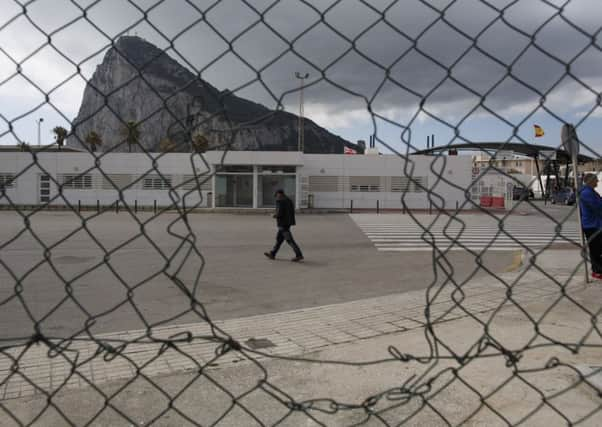Paris Gourtsoyannis: Brexit is reversible. Just not for now


Never mind that a Royal Navy task force today would include two aircraft carriers still in the shipyard with no attack jets or maritime air surveillance capacity.
Sir Michael Fallon insists, without irony, that the UK Government will defend Gibraltar’s sovereignty “all the way”, bravely ignoring that the only real threat is from Brexit, which Gibraltarians voted against by a margin so wide it would make North Korean election organisers giggle.
Advertisement
Hide AdAdvertisement
Hide AdThe Gibraltar War fought by retired generals in TV studios will prove costly despite resulting in just two casualties - Britain’s credibility in upcoming negotiations, mortally wounded in the first engagements, and its national sense of embarrassment, missing in action.
But the conflict has nonetheless been useful for the government, which may be why it took over 24 hours for Downing Street to raise the white flag of sanity.
Front pages about Gibraltar - and blue passports, and the flagship of the Royal Navy’s imaginary flotilla, a £100 million new Royal Yacht Britannia - have distracted from the conflict that should really worry Downing Street.
That is the one that will erupt on the frontiers with the pro-Brexit wing of the Conservative Party and the electorate when it finally registers just how hollow Brexit it is.
Last week Jacob Rees-Mogg invoked Sir Francis Drake to hail Theresa May as a new Gloriana to create a sovereign “Global Britain”. Like Nelson’s Victory, still the flagship of the First Sea Lord, that vision of the future is unlikely to leave port any time soon.
Setting out the government’s white paper on the so-called Great Repeal Bill, Brexit Secretary David Davis presented something a bit short of the turbo-charged sovereignty that he and other Brexiteers desire.
Far from repealing anything, the bill will do the heavy legal lifting of Brexit is a cut-and-paste job. Transferring thousands of EU laws into British statute means much of the work will be done through secondary legislation, bypassing parliamentary scrutiny. MPs will only get the chance to design new legislation in key areas, like customs and immigration.
Brexiteers said British judges would rule on British laws - but Davis made clear that in order for the legal system to continue working, decades of European case law will need to be respected after Brexit. Not temporarily, but indefinitely, with British judges told to deviate from established interpretations only “sparingly”. Legal experts also question whether British judges will be able to ignore how their European counterparts interpret the same regulations even after Brexit.
Advertisement
Hide AdAdvertisement
Hide AdThe response to the triggering of Article 50 from the European Council, which represents all 27 governments of the remaining EU member states, drove the message home. Even if trade talks do get under way within the two-year negotiation period, there is no chance of them being concluded before it ends.
A transition is therefore essential to the UK. During that period, EU council president Donald Tusk confirmed, the UK will remain subject to the European Court and will have to respect the four pillars of the single market, including the free movement of people.
One pro-Brexit newspaper, which has led the campaign for the Brexit bath toy of a new royal yacht, sought to greet Davis’ statement with some enthusiasm, presenting a list of European “red tape” to be slashed, including the infamous produce standards that have imposed straight bananas on us.
But the EU warned that if the UK wants to do business with the world’s largest market and its biggest trading partner, the kind of regulatory dumping proposed by Brexiteers was out of the question.
Our bananas will probably remain agonisingly straight, and the Tory right is more likely to win a war over Gibraltar than a fight to remove more significant EU regulations on workplace rights and environmental protection.
On immigration, Downing Street is sticking by its 100,000 net migration target, because it can’t do otherwise, but the language now being used by the government is telling. May refused to give a guarantee that net migration would be “significantly lower”, while Davis admitted that based on economic needs, “from time to time we will need more, from time to time we will need less”.
None of this will be remotely acceptable to Brexiteers, who will use troublesome complexity of real life to demand an exit without a deal, and for whom morale-boosting ephemera like gunboats off the Rock will remain exciting.
As has been discussed before, the EU referendum vote was an expression of a set of values and a belief in British exceptionalism. Along with Lord Howard’s sense of national pride, they congealed in the 1970s and remain preserved like a salad in a jelly mould.
Advertisement
Hide AdAdvertisement
Hide AdIt was as much a demographic revolt as an economic one - something confirmed by polls in the past week that put the reintroduction of blue passports, imperial measurements and the death penalty at the top of the list of things people want to see return after Brexit.
Nothing to do with the EU - even the passports, which are burgundy to help border guards tell them apart and could have been made blue at any point. Everything to do with what Britain was like when the people most likely to vote last year were children.
Without any real benefit from quitting the EU, as the reality of giving up decision-making power within your largest market hits, today’s young people raised with the benefits of the EU will follow the only path that makes economic sense.